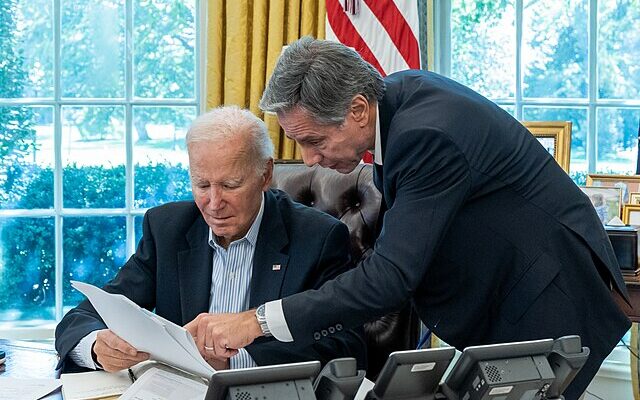
After the election of 2020, Democrats and their liberal allies had one message to the rest of the world: “the adults are back in charge.”
Joe Biden’s Cabinet Picks Send a Clear Message: The Adults Are Back in Charge https://t.co/DlaGWKyxeD via @voguemagazine
— Stewart Gandolf (@StewartGandolf) November 25, 2020
Vogue perfectly encapsulated the arrogance of the Biden administration, writing in November 2020, “In the first wave of appointments for the cabinet that Joe Biden will form after he is inaugurated on January 20, the president-elect has opted for a quality that Donald Trump mocked and disdained over the four years of his presidency: experience.
Take, for example, Biden’s pick for secretary of state, which was formally announced on Tuesday. After working on Bill Clinton’s National Security Council, Antony Blinken, 58—a graduate of Harvard University and Columbia Law School—became Biden’s chief foreign policy adviser in the Senate in 2002. He served as the Democratic staff director of the Senate Foreign Relations Committee when Biden was that committee’s chairman and then worked as an adviser on Biden’s unsuccessful presidential bid in 2008. After Barack Obama picked Biden as his vice president, Blinken returned to the White House as Biden’s national security adviser. (A blue-shirted Blinken can be seen at the back of the room in the famous photograph of White House officials, including Obama and Secretary of State Hillary Clinton, monitoring the 2012 raid that killed Osama bin Laden.) And government service runs in the family: Blinken met his future wife, Evan Ryan, in 1995 when he was working at the White House as a speechwriter on the National Security Council and she was a scheduler for first lady Hillary Clinton.”
Maybe the president should have aimed less for “experience” and more for competence. After three years, Biden’s foreign policy has undermined America’s prestige abroad so much that the White House cannot even build a functioning coalition to take on a radical terrorist group threatening shipping lanes in the Middle East.
On December 18, Secretary of Defense Lloyd Austin announced the creation of “Operation Prosperity Guardian,” saying “The recent escalation in reckless Houthi attacks originating from Yemen threatens the free flow of commerce, endangers innocent mariners, and violates international law. The Red Sea is a critical waterway that has been essential to freedom of navigation and a major commercial corridor that facilitates international trade. Countries that seek to uphold the foundational principle of freedom of navigation must come together to tackle the challenge posed by this non-state actor launching ballistic missiles and uncrewed aerial vehicles (UAVs) at merchant vessels from many nations lawfully transiting international waters.
Operation Prosperity Guardian is bringing together multiple countries to include the United Kingdom, Bahrain, Canada, France, Italy, Netherlands, Norway, Seychelles and Spain, to jointly address security challenges in the southern Red Sea and the Gulf of Aden, with the goal of ensuring freedom of navigation for all countries and bolstering regional security and prosperity.”
It only took two weeks for Operation Prosperity Guardian’s “coalition of the willing” to collapse almost entirely. Around half of the nations mentioned as participants in the international task force to patrol have not yet acknowledged their role.
Two of America’s European allies who were listed as contributors to Operation Prosperity Guardian – Italy and Spain – issued statements appearing to distance themselves from the maritime force, writes GCaptain.
The Pentagon says the force is a defensive coalition of more than 20 nations to ensure billions of dollars’ worth of commerce can flow freely through a vital shipping chokepoint in Red Sea waters off Yemen.
But nearly half of those countries have so far not come forward to acknowledge their contributions or allowed the U.S. to do so. Those contributions can range from dispatching warships to merely sending a staff officer.
The reluctance of some U.S. allies to link themselves to the effort partly reflects the fissures created by the conflict in Gaza, which has seen Biden maintain firm support for Israel even as international criticism rises over its offensive, which Gaza’s health ministry says has killed more than 21,000 Palestinians.
“European governments are very worried that part of their potential electorate will turn against them,” said David Hernandez, a professor of international relations at the Complutense University of Madrid, noting that the European public is increasingly critical of Israel and wary of being drawn into a conflict.
The “adults” may be back in charge, but they don’t know what they’re doing.
He’s not doing it with tweets, though, so it’s okay that his effect on American prestige has been the exact same as his predecessor https://t.co/DX1ldrqrAX
— Scott Howard (@ConservaMuse) December 29, 2023
Beyond the Houthis in Yemen causing trouble in the Red Sea, Iran-backed militias, likely using funds given to Iran by the Biden administration, have been attacking U.S. troops in Syria and Iraq for months.
⚡️BREAKING
Complete collapse of Operation Prosperity Guardian, after France, now Spain and Italy withdrew from this US-led naval alliance against the Houthis.
This is a major blow to global posture of USA and the US must now confront the Yemenis with mighty Bahrain and the… pic.twitter.com/l4V3HhWxRi
— Iran Observer (@IranObserver0) December 23, 2023
“So far,” reported Reuters, “the United States has carried out limited retaliatory air strikes against the militia in Iraq and Syria, but it has refrained from doing so in Yemen.
Michael Mulroy, a former deputy assistant secretary of defense for the Middle East under the Trump administration, said the Pentagon’s goal with the new maritime coalition appeared to be to make any future Houthi attacks an international issue in order to divorce it from the Israel-Hamas war.
‘Once the military vessels in Operation Prosperity Guardian start protecting commercial shipping and come under a direct attack, (the Houthis) will be attacking the coalition, not just the U.S.,'” Mulroy tol the outlet.
The problem is that as the world looks around, they have begun asking, “What coalition?”
[Read More: Biden Sues Texas For Doing His Job]











